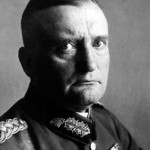 Kurt von Hammerstein-Equord (1878-1943) was commander-in-chief of the Reichswehr during the early 1930s. Of aristocratic birth, Hammerstein-Equord served in eastern Europe during World War I. After the war, he remained in the army as a divisional commander. Though he remained aloof from Weimar party politics, Hammerstein-Equord’s personal views were liberal, particularly for a general of the Reichswehr. He supported the Reichstag and the republic but had no regard for extremists on either the right or the left. Hammerstein-Equord was particularly critical of Adolf Hitler, the NSDAP and the SA, who he condemned as “criminals”. He was given command of the Reichswehr in 1930 and spent much of the next two years trying to prevent Hitler’s appointment as chancellor. He resigned as Reichswehr chief in early 1934.
Kurt von Hammerstein-Equord (1878-1943) was commander-in-chief of the Reichswehr during the early 1930s. Of aristocratic birth, Hammerstein-Equord served in eastern Europe during World War I. After the war, he remained in the army as a divisional commander. Though he remained aloof from Weimar party politics, Hammerstein-Equord’s personal views were liberal, particularly for a general of the Reichswehr. He supported the Reichstag and the republic but had no regard for extremists on either the right or the left. Hammerstein-Equord was particularly critical of Adolf Hitler, the NSDAP and the SA, who he condemned as “criminals”. He was given command of the Reichswehr in 1930 and spent much of the next two years trying to prevent Hitler’s appointment as chancellor. He resigned as Reichswehr chief in early 1934.
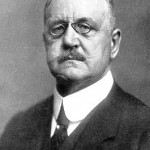 Wolfgang Kapp (1858-1922) was born in New York to German parents, who returned to Europe when Kapp was still a child. He was trained as a lawyer then entered the Prussian civil service, eventually rising to managerial positions. Kapp’s politics were conservative and enthusiastically nationalist; he supported German involvement in the war and was on friendly terms with high-ranking military officers, including Admiral von Tirpitz, Erich Ludendorff and Walther von Luttwitz. In 1917 Kapp started his own party, the German Fatherland Party; it was popular for a short time but had faded away by the end of 1918. Kapp is best known for the 1920 right-wing putsch that attempted to install him as German leader; he was neither well-known nor respected enough for the putsch to attract sufficient support. He fled to Sweden for a time before returning to Germany in 1922, just a few weeks before his death.
Wolfgang Kapp (1858-1922) was born in New York to German parents, who returned to Europe when Kapp was still a child. He was trained as a lawyer then entered the Prussian civil service, eventually rising to managerial positions. Kapp’s politics were conservative and enthusiastically nationalist; he supported German involvement in the war and was on friendly terms with high-ranking military officers, including Admiral von Tirpitz, Erich Ludendorff and Walther von Luttwitz. In 1917 Kapp started his own party, the German Fatherland Party; it was popular for a short time but had faded away by the end of 1918. Kapp is best known for the 1920 right-wing putsch that attempted to install him as German leader; he was neither well-known nor respected enough for the putsch to attract sufficient support. He fled to Sweden for a time before returning to Germany in 1922, just a few weeks before his death.
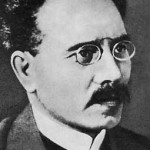 Karl Liebknecht (1871-1919) was one of the Spartacist (communist) leaders who attempted to seize control of Berlin in 1918-19. Born in Leipzig, Liebknecht’s father Wilhelm was a founding member of the SPD and spent time in prison under Bismarck’s anti-socialist laws. Karl Liebknecht graduated in law and became a passionate figure in the SPD’s left-wing, aligning himself with Rosa Luxumberg and even voting against his more moderate father. In 1912 Liebknecht was elected to the Reichstag; two years later he was the only Reichstag member to vote against the war. He continued his vocal opposition to the war through 1915, both as a writer and public speaker. The government attempted to silence Liebknecht by conscripting him, but he refused to fight, instead serving as a gravedigger on the Eastern Front.
Karl Liebknecht (1871-1919) was one of the Spartacist (communist) leaders who attempted to seize control of Berlin in 1918-19. Born in Leipzig, Liebknecht’s father Wilhelm was a founding member of the SPD and spent time in prison under Bismarck’s anti-socialist laws. Karl Liebknecht graduated in law and became a passionate figure in the SPD’s left-wing, aligning himself with Rosa Luxumberg and even voting against his more moderate father. In 1912 Liebknecht was elected to the Reichstag; two years later he was the only Reichstag member to vote against the war. He continued his vocal opposition to the war through 1915, both as a writer and public speaker. The government attempted to silence Liebknecht by conscripting him, but he refused to fight, instead serving as a gravedigger on the Eastern Front.
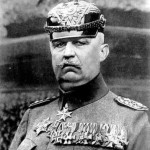 Erich Ludendorff (1865-1937) was a former military commander who became a nationalist figurehead during the Weimar era. Born in Prussia to an affluent family, Ludendorff was a bright student who entered the military at a young age. Intelligent and hardworking but generally emotionless, Ludendorff played a leading role in implementing the Kaiser’s plans to expand and modernise the German military. By the outbreak of war Ludendorff, by then a major general, was seconded to the General Staff. By 1917 he was second-in-command behind Hindenburg, though many believe it was Ludendorff who held the reins. The collapse of 1918 hit Ludendorff hard; he later blamed Germany’s defeat on the weak Kaiser, duplicitous civilian politicians, half-hearted businessmen and Jewish intriguers. After the war, Ludendorff became swept up in right-wing nationalist politics. Until the failed 1923 putsch in Munich, he was a high profile patron of the Nazi Party and a supporter of Adolf Hitler.
Erich Ludendorff (1865-1937) was a former military commander who became a nationalist figurehead during the Weimar era. Born in Prussia to an affluent family, Ludendorff was a bright student who entered the military at a young age. Intelligent and hardworking but generally emotionless, Ludendorff played a leading role in implementing the Kaiser’s plans to expand and modernise the German military. By the outbreak of war Ludendorff, by then a major general, was seconded to the General Staff. By 1917 he was second-in-command behind Hindenburg, though many believe it was Ludendorff who held the reins. The collapse of 1918 hit Ludendorff hard; he later blamed Germany’s defeat on the weak Kaiser, duplicitous civilian politicians, half-hearted businessmen and Jewish intriguers. After the war, Ludendorff became swept up in right-wing nationalist politics. Until the failed 1923 putsch in Munich, he was a high profile patron of the Nazi Party and a supporter of Adolf Hitler.
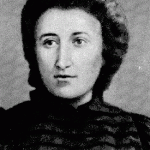 Rosa Luxemburg (1871-1919) was probably the foremost female revolutionary of her time. Born in Poland, just a few weeks after the unification of Germany, Luxemburg was well educated and became a Marxist in her teenage years. She moved to Germany in 1898 and took membership of the SPD, where she was active in writing, public speaking and political education (Friedrich Ebert being one of her early students). Luxemburg was appalled by World War I but even more by support for the war from her fellow SPD members. She was a foundation member of the Spartacus League, campaigning adamantly against the war, attempting to whip up general strikes and circulating anti-war propaganda. Luxemburg was imprisoned briefly in 1918. She became embroiled in the January 1919 revolution in Berlin (an uprising she did not fully support) during which she was captured and executed, her body flung into a canal.
Rosa Luxemburg (1871-1919) was probably the foremost female revolutionary of her time. Born in Poland, just a few weeks after the unification of Germany, Luxemburg was well educated and became a Marxist in her teenage years. She moved to Germany in 1898 and took membership of the SPD, where she was active in writing, public speaking and political education (Friedrich Ebert being one of her early students). Luxemburg was appalled by World War I but even more by support for the war from her fellow SPD members. She was a foundation member of the Spartacus League, campaigning adamantly against the war, attempting to whip up general strikes and circulating anti-war propaganda. Luxemburg was imprisoned briefly in 1918. She became embroiled in the January 1919 revolution in Berlin (an uprising she did not fully support) during which she was captured and executed, her body flung into a canal.
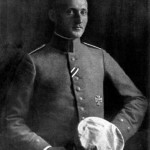 Albert Schlageter (1894-1923) was a World War I veteran, Freikorps member and opponent of France’s occupation of the Ruhr. After his discharge from the military in 1919 Schlageter, like countless other young men, found himself jobless and aimless, but politically excited by the events in Germany. He was quickly drawn to the Freikorps, where was involved in street battles with communists and support of the 1920 Kapp putsch. In 1923 Schlageter participated a raid against French forces occupying the Ruhr, damaging trains to prevent local materials being transported to France. He was betrayed, captured by the French in May 1923 and subsequently executed. Though Schlageter was a minor figure, his death was exploited by right-wing nationalist groups, particularly the Nazis, who painted Schlageter as both a hero and a martyr.
Albert Schlageter (1894-1923) was a World War I veteran, Freikorps member and opponent of France’s occupation of the Ruhr. After his discharge from the military in 1919 Schlageter, like countless other young men, found himself jobless and aimless, but politically excited by the events in Germany. He was quickly drawn to the Freikorps, where was involved in street battles with communists and support of the 1920 Kapp putsch. In 1923 Schlageter participated a raid against French forces occupying the Ruhr, damaging trains to prevent local materials being transported to France. He was betrayed, captured by the French in May 1923 and subsequently executed. Though Schlageter was a minor figure, his death was exploited by right-wing nationalist groups, particularly the Nazis, who painted Schlageter as both a hero and a martyr.
© Alpha History 2018. Content on this page may not be republished or distributed without permission. For more information please refer to our Terms of Use.
This page was written by Jennifer Llewellyn, Jim Southey, Brian Doone and Steve Thompson. To reference this page, use the following citation:
J. Llewellyn et al, “Weimar Republic soldiers and rebels”, Alpha History, accessed [today’s date], http://alphahistory.com/weimarrepublic/weimar-republic-soldiers/.
